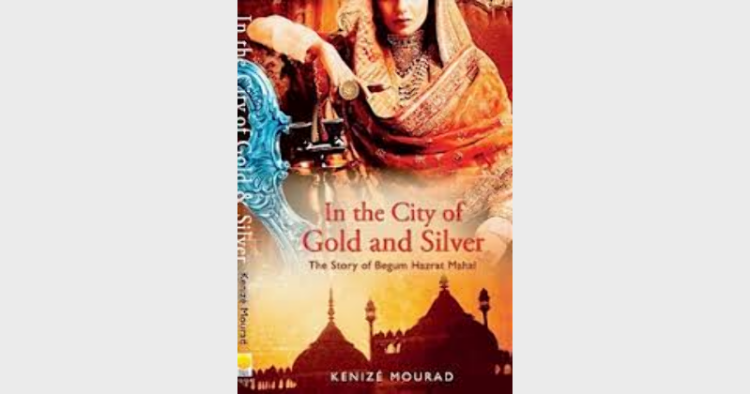Manju Gupta
In the City of Gold and Sliver: The Story of Begum Hazrat Mahal, Kenize Mourad, Full Circle, Pp 437, Rs 350.00
THIS is the life story of Hazrat Mahal, captivating wife of King Wajid Ali Shah of Awadh and an important character in the 1857 Uprising and about whom little is known.
Born as Muhammadi in a family of artisans from Faizabad, the ancient capital of Awadh, she, as a 14-year old, is taken to the Prince’s harem where she is asked to dance but she admits she can only recite verse. She is asked to do so and on hearing her, “the prince looks at her thoughtfully.” She is charmed by the prince and gets pregnant and is named ‘Iftikhar un-Nisa’, “the pride of women”, as he appreciates her dignity that sets her apart from others who are so submissive. She gives birth to a son and then ensues a covert war in the harem, where accidents and poison “are weapons that mothers must ceaselessly protect their offspring from.” Mammo Khan, the eunuch is granted to Hazrat Mahal as her protector.
She gets extremely riled when she comes to know that the East India Company has become so powerful as to annex two-thirds of the princely states while her husband Wajid Ali Shah is happy at taking refuge in music and poetry. She knows her husband is unhappy but she can hardly do anything as she is only his fourth wife. Her son, who is new seven-years old, has been shifted to men’s quarters despite his indifferent health. Hazrat Mahal has to wait for every Friday to come to meet him.
Meanwhile Governor-General Lord Dalhousie decides that Awadh will be administered by the East India Company and that the king would retain only his title and pension. On 13 March 1856, after six weeks of confrontation against the British, Wajid Ali Shah leaves his beloved town and Hazrat Mahal behind to take refuge in Calcutta. The British seize Lucknow’s most beautiful palaces and surround the palace where Wajid Ali’s concubines reside. They all start fleeing, packing their precious belongings, while the Queen Mother goes to London to present her son’s case. Six months pass but she does not get audience with Queen Victoria.
Meanwhile, chapatis mysteriously begin to appear in north and central India. It is a peasant woman named Nouran who understands the significance and on seeking audience with Hazrat Mahal tells her that distribution of chapatis “announces the Great Mutiny”.
On 10 June, Mammoo Khan, eunuch of Hazrat Mahal, comes with the news that the Meerut garrison has rebelled. Major Carnegie and his men start getting houses evacuated close to the Residency. The princesses and ladies-in-waiting find shelter in Kaisarabagh palace where Hazrat Mahal resides. Often the latter feels angry and frustrated at her husband’s lack of action but then she excuses him, thinking that “he has the right to enjoy what remains of his life rather than making himself ill.” Uprisings spread from one state to other — Benares, Jaunpur, Allahabad, Sultanpur, Gonda, almost whole of North India. King Wajid Ali Shah is lodged in Fort Williams near Calcutta. Hazrat Mahal considers this the best time to seek help from the King’s taluqdars, like Rajah Jai Lal Singh and also from the Rajah of Mahmudabad, exhorting them to take the oath either on the Holy Quran or on the jar containing the holy water of the Ganges “to fight faithfully and relentlessly to the very end; that is to say, until we have driven out the British.”
One by one, all the rajahs and nawabs take the oath, overcoming their initial hesitation at a mere dancer-turned-queen making demands on them. From here on, the author describes how Hazrat Mahal leads the people’s uprising against the British’s unwelcome pressures. She even has the support of the Indian soldiers of the British Army who have now rallied to her cause. She offers resistance for two years, displaying unusual wisdom, integrity and courage for a woman, an orphan but now a queen, leading India on its first step towards Independence.
She places her son Birjis Qadir on the throne and as the Regent, takes all major decisions. She comes to rely on Rajah Jai Lal Singh for his advice. The growing intimacy between her and the Rajah is not acceptable to her eunuch Mammoo because he realises that Hazrat Mahal has fallen in love with Rajah Jai Lal Singh.
The story unfolds to reveal her as a misunderstood mother, a silent lover and a leader who risks everything to face the greatest betrayal of all. The book needs to be read.
(Full Circle, J-40, Jorbagh Lane, New Delhi-110 003; www.fullcirclebooks.in)














Comments